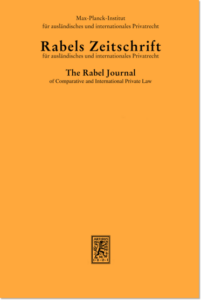Posted at the request of Aastha Asthana, Managing Editor, Trade Law and Development
CALL FOR SUBMISSIONS
General Issue
Issue 13.2 | Winter ’21
The Board of Editors of Trade, Law and Development is pleased to invite original, unpublished
manuscripts for publication in the Winter ’21 Issue of the Journal (Vol. 13, No. 2) in the form of
‘Articles’, ‘Notes’, ‘Comments’ and ‘Book Reviews’.
Founded in 2009, the philosophy of Trade, Law and Development has been to generate and sustain a
constructive and democratic debate on emergent issues in international economic law and to serve
as a forum for the discussion and distribution of ideas. Towards these ends, we have published
works by noted scholars such as WTO DDG Yonov F. Agah, Dr. Prof. Ernst Ulrich Petersmann,
Prof. Steve Charnovitz, Prof. Petros Mavroidis, Prof. Mitsuo Matsuhita, Prof. Raj Bhala, Prof. Joel
Trachtman, Gabrielle Marceau, Simon Lester, Prof. Bryan Mercurio, and Prof. M. Sornarajah
among others. TL&D also has the distinction of being ranked the best journal in India across all
fields of law for seven consecutive years by Washington and Lee University, School of Law.
Manuscripts received by August 1st, 2021, pertaining to any area within the purview of international
economic law will be reviewed for publication in the Winter ’21 issue.
Manuscripts may be submitted via e-mail. For further information about the Journal, please
click here. For submission guidelines, please click here.
In case of any queries, please feel free to contact us at: editors[at]tradelawdevelopment[dot]com.
LAST DATE FOR SUBMISSIONS: 01 AUGUST, 2021
PATRON: P.P. Saxena | ADVISORS: Raj Bhala | Jagdish Bhagwati | B.S. Chimni | Glenn
Wiser | Daniel B. Magraw, Jr. | Vaughan Lowe | Ricardo Ramirez Hernandez | W.
Michael Reisman | M. Sornarajah | FACULTY-IN-CHARGE: Dr. Rosmy Joan | BOARD OF
EDITORS: Amogh Pareek | Sahil Verma | Sukanya Viswanathan| Aastha Asthana|
Abilash Viswanathan| Malaika Shivalkar | Nishant Sharma | Pranav Karwa | Rashmi
John | Swikruti Nayak | Akshita Saxena | Ananya Awasthi | Anushka Mathur | Jahnavi
Srivastava | Khushi Agrawal | Maulik Khurana | Nidhi Lakhotia | Ria Chaudhary |
Yashvi Hora | Aarzoo Gang | Anoushka | Lipika Singla | Priyanshu Shrivastava | Simran
Bherwani | Sneha Naresh | Vipashyana Hilsayan



 The
The 